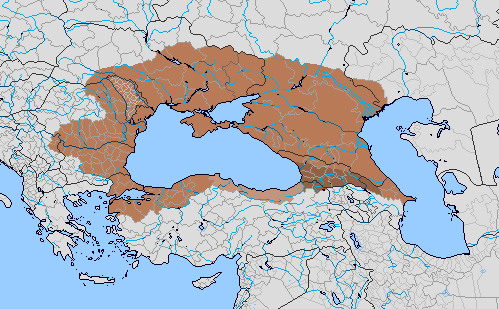History
Medieval History
Following the decline of the Huns, the Alans in the Steppes moved in to fill the power vacuum in the region. Swiftly branching out, they established their power base in the mountains of the Caucuses, spreading across the steppes of the northern Black Sea. Over the following centuries, Alania gradually settled down, consolidating their power in the region and becoming a settled kingdom. During this time Alania became a valuable ally of the Byzantines, keeping the nomadic hordes at bay. In exchange, Alania received many benefits from the Byzantines, and by the 8th century Byzantine missionaries converted the Alans to Orthodoxy. With the benefit of Byzantine sponsorship, Alania gradually expanded their power base along the Pontic Steppe, gradually expanding down into Thrace, using the Carpathians as natural borders. As they took over the steppes along the Black Sea, the Alans either displaced or assimilated the various tribes living in the region. Sponsored by the Byzantines, in the 10th-11th centuries the Alans built a wall along their eastern and northern border in the Steppes, intent on establishing a barrier to keep out the hordes. This wall was regularly manned and reinforced, and survives to this day.
As the Byzantine power base in the region began to decline in the early 12th century, the Alans moved in on Crimea, taking over the Byzantine trading cities in the region. Around this time the Alans built a massive gate and wall in the
Darial Gorge, known to foreign powers as
The Gates of Alexander. This wall was meant to control mobility into Alania, especially against the encroaching Muslims. There were also other walls and gates built along various other passes, but the Gates of Alexander are the most significant. Alongside the Gates of Alexander, the Alans also built a series of watchtower fortresses along the mountains, both in the Caucuses, as well as the Carpathian and Thracian mountains in the west. These watchtower fortresses contained signal fires, were spread along regular intervals, and were constantly manned by rotating shifts of soldiers. The watchtowers are attested to have protected the Kingdom from foreign invaders several times, having given the Alans advanced warning of approaching enemies. Both the Gates of Alexander and the watchtower fortresses survive to this day.
By the 13th century, when the Muslims began their sweep into Europe, the Alans were well situated as a regional power, still allied with the Byzantines. Utilizing their border walls, alliance system, and diplomatic treatises, the Alans made agreements and deals with the Mongols. In exchange for their continued survival, the Alans would join the Mongols as vassals. This arrangement worked well for several decades, but by the 14th century, as Mongol power declined, the Alans gathered their strength and fought for their independence. Successfully driving the Muslims out of the Pontic Steppes, the Alans declared their independence and reestablished their former kingdom. As they emerged from Mongol oppression, the Alans began to realize that the world had greatly changed, and many of their old allies were no more.
Early Modern History
Turkish War
During the late 1700s the Turks declared war, intent on conquering land from Alania, and desiring to push all the way to Crimea. Allying with other European powers, the Alans fought back, pushing the Turks hard, and eventually conquering Constantinople. In the aftermath, the Alans took a large chunk of Turkish land in Europe, and carved out the Turkish coastline, resulting in Alania completely encircling the Black Sea. While in negotiations with other European powers, the Alanian government negotiated to establish Pontus and Georgia as Alanian puppet states. These nations would be able to have full control over their own internal politics, whilst being reliant completely upon Alanian military protection. In the years that followed the treaty was modified several times, effectively making the regions nothing more than autonomous regions within Alania. Despite this, the regions are still recognized as quasi-independent nations.
Following the conquest of the Turkish European lands, as well as some of their land in Asia Minor, the Alans implemented a policy of expulsion against the Turks, gradually forcing all Turks out of their lands or assimilating them into the local culture over a period of 50 years. This resulted in the demographics in the conquered region to skew strongly Greek, with a sizeable Alanian minority. This, combined with the significant history of Greek influence on the nation, has led to Greek becoming a recognized minority language throughout the nation.
 Modern Age
Modern Age








